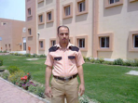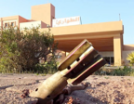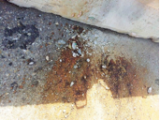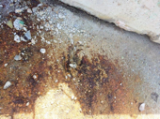February 17, 2014
This is a report
generated by Iraqi sources and compiled by Dr. Al Darraji on the case of
Fallujah, Iraq. It is not the work of the publisher. It was translated
by Omar Abdel-Ghaffar.
Government War Crimes in Anbar Province
Report by the Conservation Center of Environmental & Reserves in Fallujah (CCERF): Fallujah Case Study
February 2014
Fallujah � Iraq
1. Introduction
Since the start of the peaceful sit-ins of December 2012, numerous
peaceful protests have sprung up and spread in the Sunni Iraqi provinces
against the sectarian political system, and the continued violation of
human rights by the repressive Maliki forces. Instead of negotiating the
legal, legitimate demands of the protesters, the Maliki regime
conducted a brutal crackdown on the protests, the brutality increasing
gradually with time. The number of arbitrary mass arrests increased with
a parallel increase in killings in an attempt to exterminate the
protesters. This was especially evident in the three consecutive crimes
that took place at the beginning of 2013, where protesters were gathered
in the cities of al Huwayja, Fallujah, an Mosul. Maliki�s regime
justified its policy with the excuse of fighting terrorism, then
declared that the demands of the protesters were legitimate, only to go
back to declare war on terrorism, a war that in reality is a war against
those who oppose that regime and its sectarian government.
The Kurdish Coalition considered the DAISH (Dawlat al Islam fi al
Iraq wal Sham, "The Islamic State of Iraq and the Levant") question to
be more of a political fabrication than a terrorist reason, Mr. Shuwan
Muhammad Taha, a representative on behalf of the Kurdish Coalition, in
an interview with Sumeria News, accusing I�itilaf Dawlat al Qanun (Rule
of Law Coalition) of calling all of those who oppose it on the DAISH
question terrorists (19). The policies of political marginalization and
persecution have reached the representatives of Maliki� MPs, when they
accusing their colleagues within Parliament of being DAISHIs. A
representative for I�itilaf Dawlat al Qanun, Mr. Muhammad Sadoun al
Seyhud claimed that the political parties that refused to be present
under the Parliamentary Dome to approve the new budget were all "DAISHi"
Now, increasingly the fact of genocide plan with increasing such
statements that call for genocide under the pretext of terrorism,
according to an Iraqi newspaper term lawmakers (Mada) said on the MPs of
Prime Minister Nuri al-Maliki, said there was no part in Anbar valid to
be as party in a dialogue with the government, and that raises the
political initiatives not only serve the terrorists. Mr. Hussein Saffi
(MP in Dawa party) in a statement to this newspaper "pointing out that
military effort is the only solution to end the crisis in Anbar,
rejecting calls for dialogue advocated by some political sides,
wondering "dialogue with whom?", and added," No political party in Anbar
even talk with them, they are a group of terrorists, and any trying to
confuse it supports terrorism"(30).
Before the military operations in the province of al Anbar began,
Maliki declared that large units would be directed to go to Anbar
desert, especially the Houran Valley, with a lot of troops from the rest
of the provinces, in order to combat terrorism and the terrorist groups
that he claims have arrived from Syria!!. But, after the operations
began in Anbar Desert, he changed the redirected all of his troops to
the cities of Al Ramadi and Fallujah in a clear act of sectarian-based
extermination. Repressive policies like these were the main motivation
for the uprising in the first place, in addition to the general public
refusing to ignore the existence the crimes of his unconstitutional
private forces, SWAT. The military operations began on Maliki�s part
when he, with the use of the military, arrested an MP, Mr. Ahmed
Al-Alwani and assassinated his brother and his sister-in-law.
Immediately afterwards, he ordered attacks on the protesters in the
square in Al Rumadi, in order to make sure that the protests would not
remain peaceful, and that it would turn into a sectarian conflict, one
which he could manipulate to his advantage in the election of April
2014. Since December 22, the Maliki government has been carrying out an
operation in the Anbar desert under the banner of fighting the terrorist
groups that are hiding there, but it soon became clear that it was a
widespread, armed attack directed at the residential areas in Rumadi and
Fallujah, with random bombing of buildings using heavy artillery,
tanks, and air strikes.
Unfortunately, the Security Council�s declaration of support for the
Maliki war on terror has not taken into consideration the deadly attacks
carried out against innocent Sunnis, and the opposition in general.
This grossly inappropriate reaction on the part of the international
community is the result of the UNAMI failing to bring accurately relate
the humanitarian crisis and genocide crimes by the Mailiki� regime�s
operations. Evidence of the corruption and deliberate cover-up on the
part of the UNAMI in favor of the Maliki� regime can be seen in its
disregard for human rights, as shown in the delay in the periodical
reports of the human rights situation in Iraq. This report originally
was released every three months, then every six months, and now it is
released only once a year, making it not as accurate of an analysis. The
UNAMI has also failed to take any action by invitation the Special
Rapporteurs of human rights to Iraqi for investigate the mass crimes and
violations of Maliki� regime, despite the numerous reports that expose
his brutality and repression.
The continuing genocidal policies against the Sunnis in Iraq
motivated a member of the European Parliament, Mr. Struan Stevenson, who
heads the European Parliament Committee on Relations with Iraq, to say
that "Iraq is regressing quickly to a state of civil war and ethnic
cleansing." His point is made even clearer through the televised
speeches by Maliki, in which he threatens the protesters, and, with
sectarian language, encourages supporters to aid him in his struggle
against the residents of Anbar.
In the midst of this political drama, the residents of Anbar and
Fallujah have been forced to take action in order to protect themselves
from the very real threat that the Maliki forces pose. Self-defense of
course, is a right that has been enshrined in all Divine and human-made
legal codes, and is a necessity for the inhabitants of these provinces
in the face of the criminal policies of this sectarian government.
The dangerous situation of systematic targeting against the residents
of Anbar, especially those in the cities of Al Rumadi, Fallujah, al
Karmah, and al Khalidiyah, in addition to the government�s decision to
cut off all humanitarian aid to those cities as well as nearby cities
which host thousands of refugees, all confirm the policy of sectarian
extermination which many international politicians and analysts have
warned of. The inhuman cruelty of the attacks carried out by the Maliki
regime demands the international community�s immediate intervention in
order to stop the massacres mentioned in this report, keeping in mind
that the population of Fallujah and its nearby towns adds up to 650,000
civilians.
2. Crimes of Genocide and Collective Punishments Against Civilians
Since the start of the military operations in Fallujah on 22 Dec.
2013, the indiscriminate bombing of the city targeted all aspects of
life within it. The residents of Fallujah have accused the Maliki
government of murdering their children by bombing schools and
demolishing mosques and homes (22,10,23). The victims of the Iraqi
forces� artillery, which are centered in Mazra�a Camp near Fallujah,
have confirmed that many bombs fell on their houses in the morning,
while families were having breakfast, injuring numerous women and
children in the village of Sbeyhat (the city of Karma) near Fallujah
(4). An elderly man (living in the area of Jubeil) who was injured upon
exiting the taxi-cab that had taken him to the city from Baghdad,
claimed that the military had opened fire on him meters after he left
the area which they controlled. He was transported to the hospital with
life-threatening wounds and a critical state of shock (6).
The family of a young girl who was shot during a battle in the
Na�imiyah area of the city confirmed that the conflict has forced all
the residents to flee, and that the regime�s forces targeted families
attempting to return to their homes (7). Eye-witnesses and citizens
related to victims in the city of Karmah have released a video of
panicking orphaned children whose orphanage had been bombed and reduced
to rubble (9). Towards the end of January 2014, Liqaa Wardi, an MP
accused the Maliki government of failing to fulfill its promise of
stopping the bombing of Fallujah and other cities in the south of Anbar,
claiming that over 15 rockets had been fired in the different areas of
city. Wardi said in an interview with Sumeria News that the central
government has not stood by its promise of ceasing the shelling in
Falluja city, where 15 rockets and mortars were dropped in the areas of
Na�imiyah, Buwahwy, and Jamilah, south of Qadaa, resulting in many
casualties, including a female refugee who was living in a school (15).
Another witness was Mr. Hmed al-Isawy, aged 32, who was a assistant
in a high school in Amriya, Fallujah. He recalled for us that on January
28, 2014, government forces bombed the Buwahwy area, near Fallujah, and
blew up several houses, and killed livestock, as can be seen in the
images attached below. This incident has been confirmed also by Ms. Aum
Jamal, when she was present with her family displaced from Fallujah, in a
mosque at this area when the shells rained down on as indiscriminate
shelling on the area, many residents rushed to her children rescued by
smuggled with the families of the other car out of the danger zone. She
has been displaced from her house in Fallujah ( neighborhood Ressala)
out of Fallujah because of the indiscriminate shelling on Fallujah, and
fear for her children life (32).
2. 1. Statistics Regarding the Victims of Shelling in Residential Areas
The chief of the Residing Physicians in General Fallujah Hospital, Dr
Ahmed Shami Jassem, spoke to us about the number of victims as of
January 27th 2014, saying there were 313 severely wounded
civilians (amongst them 31 children, 31 women). The number of dead is 59
martyrs (amongst them 10 children and 4 women). He added that bullets
caused most of the wounds during the first three days of the operation,
which proves that military tried to force their way into the
neighborhoods of the city. This contrasts with the wounds that he
treated after January 3rd 2014, which were caused by shrapnel due to the indiscriminate shelling of the city and its homes (2).
We were able to find an official medical document that confirms that
the number of civilian casualties in Fallujah since the beginning of the
military operation by the Maliki Regime on December 30 2013 up until
February 5th 2014 is 452 victims. Of them, 69 have died, and
383 were wounded. Of the wounded, 40 were children and 39 were women,
and amongst the dead 10 were children and 4 were women (12). While
another medical sources in Fallujah said the number of martyrs reached
85, while the wounded had exceeded the 400 injured, mostly children,
women and the elderly (30).
2.2. Eye-Witness Accounts of the Indiscriminate Shelling
Many satellite television channels have tried to relay to the public
the indiscriminate shelling against the civilians in the city of
Fallujah (18). Below, we have excerpts of some cases and eyewitness
accounts of victims and their families as following:
1) According to documentary films passed on a satellite channel and
workers in place mortuary in General Hospital, has killed two families
of six members were eating their dinner during the fall of the shell on
them in the house the night of January 23 to 24, 2014, as the wounded
wife one and remained the daughter of one of them the only survivor of
the accident and the accompanying image her name is Ayat Mohammed Fayyad
(10 years old) , note that the incident occurred in the neighborhood of
Nazzal (5) .
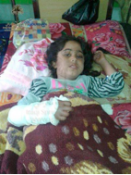 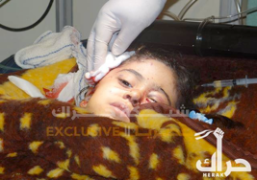
2) Lamiaa (25 year-old) spoke to us about one of her female relatives
who lay beside her in the Intensive Care Unit of the Fallujah hospital.
She said that her house was targeted with mortars and heavy artillery,
fired at them from the Na�imiya Police Station during the government
forces� attack on the residential neighborhood. Her relative said that
she was shot in the head, and surgeons had to intervene in order to
remove the shrapnel from her head and she currently is bed-ridden and is
in critical condition (1).
3) A young girl (Assile Jaber Hamid Ghatran) (aged 14), she was
wounded by shrapnel in her neck, the upper right side of her body, and
the lower left side of her body, as can be seen in the picture below.
   
4) The girl (Adian Omar) from al Dubbat District, aged 4 months, was wounded on the evening of January 24th
2014 due to a mortar landing on her relative�s house. A window near her
fell upon her, severely wounding her head, as can be seen in the images
attached below.
  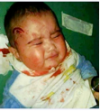 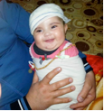
5) The young girl (Fatima Thamir Hamid) (11 years old) was wounded by
shrapnel on her left hand, as can be seen in the image below.
   
6) Documented information has reached us from medical sources
regarding the civilians who arrived in the Fallujah hospital on January
30th, 2014. Their images can be seen below, and they are:
- Iman Muhammad Abdel-Razzaq, 40 years, female, wounded in Karmah, Fallujah
- Ishaaq Saleh Muhammad, 4 years, male, wounded in Karmah, Fallujah
- Abire Saleh Muhammad, 18 years, female, wounded in Karmah, Fallujah
- Shurouq Burhan Ali, 7 years, female, wounded in Resalah, Fallujah
- Ashwaq Muhammad Jassem, 25 years, female, wounded in Resalah, Fallujah
- Sarah Muhammad Awdah, 13 years, wounded in Karma, Fallujah
- Fatima Muhammad Awdah, 15 years, wounded in Karmah, Fallujah
- Saleh Muhammad Abdel-Razzaq, 45 years, wounded in Karmah, Fallujah
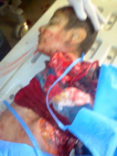 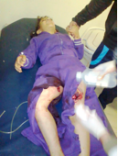 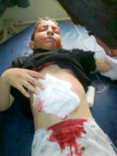 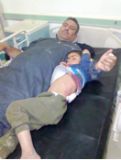 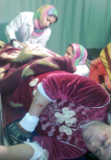 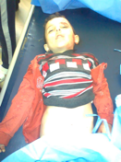 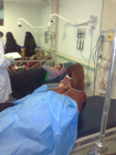 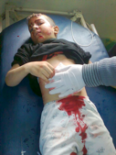 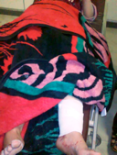
7) Amongst the tragic stories that have been relayed to us is the
story of Abu Muhammad al Falluji (Ali al Halbusi) who lies today in the
Intensive Care Unit in one of Erbil�s hospitals, capital of the
semiautonomous territory of Kurdistan. He has been in a situation
between life and death for two weeks now, and he does not know that he
has lost two of his children due to shelling by the military. The family
claims that the shelling occurred on the Nazzal neighborhood in the
center of Fallujah, and the shell fell upon his house, which he refused
to abandon, due to his belief that maybe a diplomatic solution would
solve the Anbar Crisis. In an interview with Mada press, Karim Hassan
al Halbousi, the victim�s relative, said "Abu Muhammad, who is 53 years
old, was an officer�s assistant in the former military. After the
dissolution of the military, he worked as a cab driver in a car owned by
his brother. Al Halbousi added that "He provided for three children,
two of them are boys in middle schools. The lone survivor is a girl
whose engagement to her cousin was supposed to be announced but had to
be postponed due to the conflict. An eyewitness clarified to us that he,
on "Wednesday morning (January 15th 2014) issued a warning
about the number of casualties due to the density of the bombings. One
of these stray bombs fell upon Abu Muhammad�s kitchen while the family
was having breakfast." He remarks that "The mortar resulted in the
destruction of the entrance of the house and prevented neighbors from
saving Abu Muhammad�s family, except after a lengthy struggle which
involved not only direct neighbors, but people from all over the Nazzal
neighborhood." He added that the event resulted in the immediate death
of Abu Muhammad�s two sons, and in his own injury, in addition to
resulting in his wife and daughter suffering from minor injuries. He
continues: "The medical team in the Fallujah hospital performed two
urgent surgeries on Abu Muhammad, but failed to improve his condition or
awaken him from the coma. He was placed in a coma due to a piece of
shrapnel that was lodged near his brain, in addition to damage to his
liver and right kidney, as well as several fractures in his leg." On his
part, another relative of Abu Muhammad�s named Ali Muhsin al Halbousi,
in an interview with Mada Press claimed that "The Fallujah hospital
suffers from a lack of resources and an overcrowding of casualties.
Also, it is threatened by shelling as well, for two bombs were detonated
near the Emergency Room door, which prompted us to consider moving Abu
Muhammad, but we could not decide where to� we were constantly concerned
with how we could move him within the city and out of it throughout his
surgeries and despite his critical condition, because of the constant
fighting and dense shelling between the army and the armed rebels in our
neighborhoods."
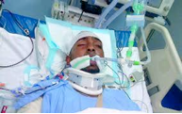
8) On January 26, 2014, Dr. Wissam Jassem al Isawi admitted that the
hospital had received that morning 35 injured civilians and 7 martyrs,
amongst them women and children. The Maliki regime�s forces had begun to
indiscriminately shell the residential suburbs in the Naimiya
neighborhood, Karma city, and al Saqlawiyah city, ensuring that all of
the victims were members of peaceful families that had stayed in their
homes during the shelling (21). While some local activists published
interviews with the families of the victims of pictorial civilian was
hit and damaged as a result of indiscriminate shelling by the forces of
al-Maliki regime (25).
On January 30th 2014 an MP representing Fallujah (Liqaa
Wardi) criticized the Maliki regime�s failure to stop the indiscriminate
shelling of Fallujah (15). The cruelty of the regime�s forces against
innocent civilians violates article three of the Geneva Convention. This
article demands that in the case of armed conflict in the territory of
one of the belligerents, anybody who is not participating "must be
treated with humanity at all times".
2. 3. The Crimes of Bombing Medical Centers and their Cadres
Fallujah Hospital was targeted more than three times up till January 27th
by government forces. The first time, a mortar was dropped on the
hospital, which resulted in the injury of civilians who had gone to the
hospital for medicine. The second shelling damaged the roof of the
building, causing major monetary damage. The third attack was artillery
shelling which heavily damaged the hospital, and caused a power outage.
The Head of the Doctors Residing in the Hospital confirmed that the
general state of depression, terror, and fear amongst the medical cadres
was overwhelming, not to mention the dangerous psychological effect the
shelling has on the patients. In addition, medical staffs who works in
the hospital was targeted on his way to work. Mr. Muayed Salman al
Furaji was killed by bullet wounds shot by the Maliki regime�s forces on
January 28th, 2014 as he entered Fallujah, coming from his home in the Bufraj area near the town of al Rumadi.
Lft: Mr. Muayed Salman al Furaji. Rt: Shell in front of the emergency department at the hospital
|
|
On the evening of Sunday, February 2nd, 2014, the private
hospital of Talib Hammad was damaged by several shells fired by the
Maliki regime, as is depicted in the pictures of the journalist Shaker
al Muhammadi of the Al-Waleed news agency. Other film published of
locals documenting this crime (28).
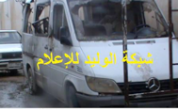 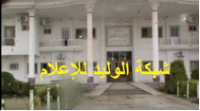
On February 4, 2014, and citing satellite Fallujah channel, a
spokesman for the hospital in Fallujah Dr. Wissam al-Issawi confirmed
that fall 3 shells on nearby Falluja Medical College Hospital for the
educational year, which caused some damage of building. This accident
news also confirmed by the Al-Waleed news agency, Local News, which was
published the following photos to the scene :
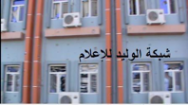 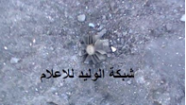 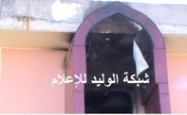 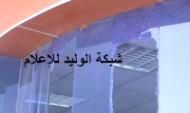
2. 4. Probability Use of Shells Carrying Chemical Weapons and Fissile Weapons
Some information from eyewitnesses within Fallujah has confirmed that
gasses defused from some mortar shells for several hours after they
landed. Mahmoud Nouri Kamel, one of these eyewitnesses has given us
images of these thermal shells, which fell on the city yesterday, near
ice cream of Fairouza. When the shells fell, a strong flame blazed from
it, and a chemical vapor that smelled like rotten eggs wafted towards
those nearby. Images below depict the occurrence. Other eyewitnesses
have sent us videos of the remains of a mortar that exuded a
nausea-inducing vapor (8).
An eyewitness confirmed for Al-Taghier Satellite Channel that the
military used fissile (cluster) weapons targeting markets, homes, and
mosques. Medical sources in the city hospital of Fallujah have spoken of
tens of civilians suffering from injuries and deaths due to such gases
yesterday as the military tried to regain control of the city from the
tribesmen who currently lead the resistance and have control of the city
(11).
3. Forced Displacement of Civilians
The brutality of the indiscriminate shelling of residential
neighborhoods has forced tens of thousands of civilians to exuding or
escaping from the city. The estimation of humanitarian aids workers said
about 40% of the original population still resides within the city.
Most of the citizens who remain depend on daily salaries, meaning that
they do not have the resources to rent a house outside of the city. Many
civilians, when interviewed by satellite television channels said that
they are forced to remain under life-threatening shelling due to their
inability to leave and find refuge anywhere else (17). Others were
forced to seek refuge from the fighting in abandoned skeletal buildings
despite the lack of electricity, water, heat, and cooking utilities
(24).
UN Reports confirmed the displacement of over 65,000 people due to
the struggle in the towns of Fallujah and al Rumadi, and has left over
140,000 people homeless. The violent shelling has damaged numerous
schools and hospitals and has thus displaced those families that were
residing in them.
While children�s organization UNICEF pointed that more than 40 000
children have been displaced with their families in addition to the
killing and wounding many of them through indiscriminate shelling of the
city and the organization continues its attempts with the Maliki regime
in order to create safe corridors for the exit of the displaced
families with kids. While the International Organization for Migration
(IOM) confirming on the 44 000 families have been displaced from Anbar,
because of the military campaign of the owners of the cities (30).
Many civilians moved to the villages surrounding Fallujah, and a
large group of them have moved to the north of Iraq and the other cities
of Anbar and nearby Salahul Din. Others have resorted to residing in
schools, the lack of temporary housing forcing them to live in
classrooms.
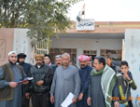 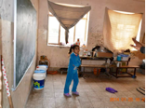 
The Watanya (National) Coalition, which follows the former Prime
Minister, Iyad Alawi has admitted in a public statement dated on
February 1st 2014 that "The residents of the city of Fallujah
suffer under deteriorating humanitarian conditions which should inspire
shame in any Iraqi who seeks the continued unity of the nation, and the
protection of its future." The Watanya Coalition has also declared that
"Fallujah is a city in a state of disaster, and promised to send
immediate delegations to the UNAMI and the Red Crescent to provide the
necessary humanitarian aid for the displaced families, since the
government has failed to do so." This statement confirms the sheer size
of the government cover-up on this genocidal crime, which is directed
even towards refugees who fled the city because of the military
operation. It also confirms the scandalous cover up and complete
disregard on the part of international humanitarian organizations, not
only in providing aid, but also in observing and implementing the
articles of the Geneva Convention in cases of war.
President of the Iraqi Parliament Mr. Osama Najafi said that there
are 50 000 families have been displaced due to military operations in
Anbar province, and added that the conditions of those displaced so bad
to the point of need general alarm !! Iraqi Red Crescent Society
announced, in (January 30, 2014 ) , for the high number of displaced
people from Anbar to more than 46 thousand families, emphasizing
assistance to more than 24 thousand families of it (13) . Which means
more than 22 000 displaced families stayed without humanitarian aid !!
We documented in recent days, some of the films that demonstrate the
survival of many civilians inside Fallujah on 1 � 4February 2014, near
the local markets for vegetables and food , which forced civilians to
come out in these tough times for shopping or livelihood daily (20) . In
addition to the deployment of activists inside the city for the movies
to prove survival of many families that their points of relief in the
inner city with more than 100 000 civilians, most of them from poor
families and earning power per day, or are unable to work (29).
The greatest proof of the sectarian gov. an is the report by refugees
from Anbar, when they arrived to the capitol Baghdad, complaining of
restrictions placed on them by the armed forces, and the continued
arrests, as well as the searching of Sunni quarters of the city,
obstructing the daily lives of the families living in them. Since the
arrival of fleeing families from Fallujah and al Rumadi to the capitol,
the military, under the excuse of security reasons, has been conducting
raids on these fleeing families. Numerous refugees have been arrested in
the Sunni areas of Amriya, Ghazaliya, Sayedeya, Yarmouk, and Hittin,
which house the families that fled the indiscriminate shelling in their
homes. In addition, the local city councils in these areas has also
expressed a need to review the families which flee to it, in order to
keep a record of the number of families present in each area and handing
them [I don�t know if they mean the records or the families] over to
the government forces. On the other hand, the fleeing families were
banned by the Maliki forces from entering the cities of Samraa except
after showing proof of a sponsor-resident from within the city.
With the promotion of government sources and parliamentary belonging
to Maliki�s bloc, for that there is the risk of the spread of terrorism
and spread in the rest of the provinces after being accused the people
of Anbar as they have become an incubator for terrorism!!, it is the
definitive evidence to planned extermination arguments did not prove,
but in their imaginations criminal diseased (31).
Now I have ever been trapped in the city of Fallujah, about more than
a month did not stop the indiscriminate shelling of government or
restless. Over the days get complicated living situation and
deteriorating humanitarian situation, the center of the steadfastness of
the people and their determination to hold fast to the demands for
which more than a full year (26). As the cut cellular communications in
Anbar province has increased the effects of the blockade against
civilians and increase the suffering in the lack of communication
between their children displaced in other areas or with the views that
have prevented aid from entering the cities of Fallujah and Ramadi,
except in limited cases. This prompted Motaheidon block MPs to threat to
sue the cellular phone companies because of this non- humanitarian work
after pressure Maliki regime, in order to tighten the blockade and
prevent the dissemination of news of crimes and the fact that the
humanitarian situation there is frightening (27). On 5 February 2014,
the head of the parliamentary Committee on Migration Liqaa Wardi
announced to Al-Tagheir channel that the 15 thousand displaced people
from Anbar to Kurdistan scored only three thousand of them!! (27).
4. Recommendations
- Urgent international action to stop the military operations in the
province of Anbar, which could be considered an operation of mass
punishment that reach the genocide level, in order to protect civilians
and to make it possible for the knowing the truth, especially the
catastrophic humanitarian crisis taking place right now.
- The creation of an international investigation committee on behalf
of the UN Security Council or the UN Human Rights Council. Although all
of the information available indicates an international crime within the
jurisdiction of the International Criminal Court, which requires the
action from the Prosecutor to investigate all available information.
- A review of the mechanisms used by the UNAMI in Iraq, which have
become a burden on the people, giving these transgressions political
legitimacy. And it became necessary to return the position of the
Special Rapporteur for Human Rights in Iraq.
- Stopping any military aid to the Maliki regime�s government in Iraq
until the investigations surrounding the crimes that have been committed
are done.
- The urgent entrance of international aid organizations in order to
alleviate the poor living conditions of the refugees, who number more
than 200 thousand from the city of Fallujah and its nearby villages, in
addition to 100 thousand within the city.
- The need to adopt solutions based on justice and transparency in
knowing the facts and to hold the perpetrators, whatever their
positions, and stay away from political solutions that represent the
agendas of some political parties, domestic or international , which not
only bring us more of the devastation and suffering over the past ten
years.
- The need urgent action by the International Red Cross in the
verification of war crimes in violation of the Geneva Conventions,
especially with all the evidence documented in this report . And the
need to bring the perpetrators of the war against international forums
as stipulated in their responsibility, which gave her the international
community.
- The need for international pressure to force the Iraqi government to
sign and ratify the Convention on the International Criminal Court to
halt the series of genocide in Iraq.
5. References
- Testimonies of people with indiscriminate bombing of the al-Maliki government forces. Arabic speech. http://www.youtube.com/watch?v=yVL7r5aIq9o
- An interview with a chief of doctors residents in Fallujah General Hospital Dr. Ahmed Shami on January 28, 2014. http://www.youtube.com/watch?v=yVL7r5aIq9o
- Some houses which have long been indiscriminate shelling in the neighborhood of Al Askary in Fallujah. http://www.youtube.com/watch?v=iu5oFlpwnhw&feature=youtu.be http://www.youtube.com/watch?v=FR6DDDZR_SY&desktop_uri=%2Fwatch%3Fv%3DFR6DDDZR_SY&app=desktop
https://www.youtube.com/watch?v=u4FhnfTvWHw
- Women injured as a result of indiscriminate shelling on the vine spend east of Falluja 30/01/2014. https://www.youtube.com/watch?v=ujvAhBZRcpA#t=11
- Government bombardment on Fallujah kills entire family in the Nazzal
neighborhood. TV Al-Tagheir channel. January 24 January 2014. http://www.youtube.com/watch?feature=player_embedded&v=NCxE70oLjrU http://www.youtube.com/watch?v=to2ZufAq8t8 http://www.youtube.com/watch?v=s-bwDqZs7Oo
- Government forces firing on unarmed elderly man at the entrance to Fallujah 30/01/2014.http://www.youtube.com/watch?v=TakKov5Jflk&feature=youtu.be
- Woman infected as a result of indiscriminate shelling of the government army forces on civilian homes in the city of Fallujah. https://www.youtube.com/watch?v=phfJfAXZjUA
- Pictures of the remains of the projectile, which took place yesterday in the Fallujah mosque near Othman bin Affan in Fallujah. https://www.facebook.com/photo.php?v=587398334673325&set=o.427881547231780&type=2&theater
- Home was bombed Bakarmh orphans and children appeal to the world to
intervene to save them from government aggression 01/25/2014. http://www.youtube.com/watch?v=qrYb7tP6M6I
- Fallujah residents accuse the prime minister of killing their
children and the demolition of mosques and homes. TV Al-Tagheir channel.
2 February 2014.http://www.youtube.com/watch?v=1c0L8X3lmK4 http://www.youtube.com/watch?v=zmrAucrDgBw http://www.youtube.com/watch?v=Hkd0RCN-lkI http://www.youtube.com/watch?v=MQG4MCz42Ag http://www.youtube.com/watch?v=L-Kg0UXi4Dc http://www.youtube.com/watch?v=UG3-ZHpz4mk http://www.youtube.com/watch?v=FQgdTnF7_QI&src_vid=LG2qq7vttBo&feature=iv&annotation_id=channel%3A51a540a5-0-2161-8f8c-bcaec54d4d4e http://www.youtube.com/watch?v=-ISrbM5aQQY http://www.youtube.com/watch?v=Gfs6wUiQmzo https://www.facebook.com/photo.php?v=416263658505283&set=vb.272558326209151&type=3&theater http://www.youtube.com/watch?v=gYsQezyunTQ http://www.youtube.com/watch?v=Y8RnNEEHgr4
- Army shells used in the bombing of fissile revive Fallujah after failing to break into. TV Al-Tagheir channel. 2 February 2014. http://altaghier.tv/2014/02/02/%D8%A7%D9%84%D8%AC%D9%8A%D8%B4-%D9%8A%D8%B3%D8%AA%D8%AE%D8%AF%D9%85-%D9%82%D8%B0%D8%A7%D8%A6%D9%81-%D8%A7%D9%86%D8%B4%D8%B7%D8%A7%D8%B1%D9%8A%D8%A9-%D9%81%D9%8A-%D9%82%D8%B5%D9%81-%D8%A7%D8%AD%D9%8A/
- Medical document issued by the hospital in Fallujah on February 2, 2014.
- Najafi : 50 000 families have been displaced from Anbar, and their
need to declare a state of the horn . Alsumaria TV. 2 February 2014. http://www.alsumaria.tv/news/92037/%D8%A7%D9%84%D9%86%D8%AC%D9%8A%D9%81%D9%8A-50-%D8%A7%D9%84%D9%81-%D8%A7%D8%B3%D8%B1%D8%A9-%D9%86%D8%B2%D8%AD%D8%AA-%D9%85%D9%86-%D8%A7%D9%84%D8%A7%D9%86%D8%A8%D8%A7%D8%B1-%D9%88%D8%A3%D9%88%D8%B6/ar
- Chihod describes the blocks impeding the adoption of the budget as "DAISHi." Alsumaria TV. 1 February 2014. http://www.alsumaria.tv/news/91941/%D8%A7%D9%84%D8%B5%D9%8A%D9%87%D9%88%D8%AF-%D9%8A%D8%B5%D9%81-%D8%A7%D9%84%D9%83%D8%AA%D9%84-%D8%A7%D9%84%D9%85%D8%B9%D8%B1%D9%82%D9%84%D8%A9-%D9%84%D8%A5%D9%82%D8%B1%D8%A7%D8%B1-%D8%A7%D9%84%D9%85%D9%88%D8%A7%D8%B2/ar
- Deputy for Motahedon bloc accuses the government of not fulfill its
commitments on the stop the bombing of Fallujah. Alsumaria News. January
30 January 2014. http://www.alsumaria.tv/news/91831/%D9%86%D8%A7%D8%A6%D8%A8%D8%A9-%D8%B9%D9%86-%D9%85%D8%AA%D8%AD%D8%AF%D9%88%D9%86-%D8%AA%D8%AA%D9%87%D9%85-%D8%A7%D9%84%D8%AD%D9%83%D9%88%D9%85%D8%A9-%D8%A8%D8%B9%D8%AF%D9%85-%D8%A7%D9%84%D8%A7%D9%8A%D9%81%D8%A7/ar
- Witnesses dozens of families migrating from the area east of the
city of Fallujah Abadi because of indiscriminate shelling. TV Al-Tagheir
channel. January 30 January 2014. http://altaghier.tv/2014/01/30/%D8%B4%D9%87%D9%88%D8%AF-%D8%B9%D9%8A%D8%A7%D9%86-%D8%A7%D9%84%D8%B9%D8%B4%D8%B1%D8%A7%D8%AA-%D9%85%D9%86-%D8%A7%D9%84%D8%B9%D9%88%D8%A7%D8%A6%D9%84-%D8%AA%D9%86%D8%B2%D8%AD-%D8%B9%D9%86-%D9%85%D9%86/
- Fallujah residents declare their stay in their homes in defiance of
indiscriminate shelling of the city. TV Al-Tagheir channel. January 28
January 2014. http://www.youtube.com/watch?v=9UwKgFgvjzM
- Army continues bombing civilians in Fallujah and the succession of
deaths and injuries, most of them women and children. TV Al-Tagheir
channel. 26 January 2014. http://www.youtube.com/watch?v=_dH6kRAtyx0
- Kurdistan Alliance: Daish issue of fabricating a political rather than a terrorist. Alsumaria News. February 1, 2014. http://alakhbaar.org/home/2014/2/162169.html
- Public life for the people of Fallujah, near the local shopping centers and the daily work in the sale of vegetables and food. http://www.youtube.com/watch?v=wEBuse0Sk5w https://www.youtube.com/watch?v=qWCYMNexjP0 http://www.youtube.com/watch?v=1arqlJtkYGc&feature=youtu.be
- Fallujah hospital is full of Iraqi Army random shelling victims. http://www.youtube.com/watch?v=PL5Wv-suxSc
- Al-Maliki Air Force bombing on Abu Ayyub al -Ansari mosque in Fallujah. https://www.facebook.com/photo.php?v=1458883930999835
- Massive destruction caused to civilian homes impact of the
continuing shelling violent boiling of Fallujah. TV Al-Tagheir channel. http://www.youtube.com/watch?v=3rrzXYg9_3s
- Family without a water escape from the bombing of Fallujah to the semi- abandoned building outside the city. http://www.youtube.com/watch?v=PPafpF1lvsM&feature=youtu.be
- Testimonies of families hit and injured her children because of the indiscriminate shelling of the al-Maliki regime forces. https://www.facebook.com/photo.php?v=416272251837757&set=vb.272558326209151&type=3&theater https://www.facebook.com/photo.php?v=416233188508330&set=vb.272558326209151&type=3&theater https://www.facebook.com/photo.php?v=416113728520276&set=vb.272558326209151&type=3&theater
- The humanitarian situation is deteriorating dramatically inside
Fallujah and the United Nations criticized the siege of the city. TV
Al-Tagheir channel. 4 February 2014. http://www.youtube.com/watch?v=O3WYzOMI0j4
- Motahedon block: will we prosecute telecommunications companies that
cut their services for the province of Anbar. 4 February 2014.
Alsumaria TV. http://www.alsumaria.tv/news/92178/%D9%85%D8%AA%D8%AD%D8%AF%D9%88%D9%86-%D8%B3%D9%86%D9%82%D8%A7%D8%B6%D9%8A-%D8%B4%D8%B1%D9%83%D8%A7%D8%AA-%D8%A7%D9%84%D8%A7%D8%AA%D8%B5%D8%A7%D9%84%D8%A7%D8%AA-%D8%A7%D9%84%D8%AA%D9%8A-%D9%82%D8%B7%D8%B9%D8%AA/ar
- Maliki�s forces bombed a hospital in Fallujah 02/03/2014. https://www.youtube.com/watch?v=eYcdnkvJC8Q https://www.youtube.com/watch?v=9Gc7ZsF-s_w
- Interviews with many of the families remaining in the city. http://www.youtube.com/watch?v=4-yIDtY7MZ4 http://www.youtube.com/watch?v=JnsDyDQ1ELs
http://www.youtube.com/watch?v=iUeMG64u3bw http://www.youtube.com/watch?v=1bycBEIlvWU&feature=youtu.be
- The displacement of about 40 thousand Iraqi children with their families. Al Jazeera TV.http://www.youtube.com/watch?v=oxBi-g7bgsI&feature=youtu.be
- PM Block (Dahwa party): the storming of Fallujah needs to study the
minute. And her families are forced to be an incubator for militants.
Mada Newspaper. February 5, 2014. http://almadapaper.net/ar/news/458668/%D8%AF%D9%88%D9%84%D8%A9-%D8%A7%D9%84%D9%82%D8%A7%D9%86%D9%88%D9%86-%D8%A7%D9%82%D8%AA%D8%AD%D8%A7%D9%85-%D8%A7%D9%84%D9%81%D9%84%D9%88%D8%AC%D8%A9-%D9%8A%D8%AD%D8%AA%D8%A7%D8%AC-%D9%84%D8%AF%D8%B1%D8%A7%D8%B3%D8%A9
- Survivor testimony of Aum Jamal from Ressala neighborhood in Fallujah. http://www.youtube.com/watch?v=1bycBEIlvWU&feature=youtu.be
Source
|
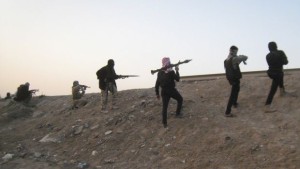
 Brussels, Asharq Al-Awsat—Sheikh
Rafi Al-Rifa’i, the Sunni Grand Mufti of Iraq, hit out at the Iraqi
government on Sunday, saying dialogue with Prime Minister Nuri Al-Maliki
was “pointless,” and described the events in Fallujah as “genocide.”
Brussels, Asharq Al-Awsat—Sheikh
Rafi Al-Rifa’i, the Sunni Grand Mufti of Iraq, hit out at the Iraqi
government on Sunday, saying dialogue with Prime Minister Nuri Al-Maliki
was “pointless,” and described the events in Fallujah as “genocide.”

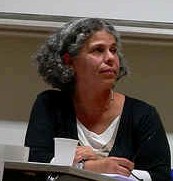
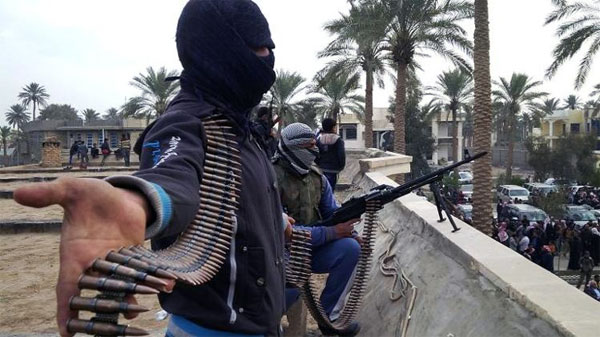

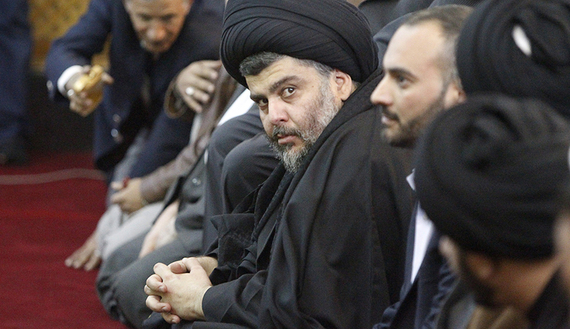

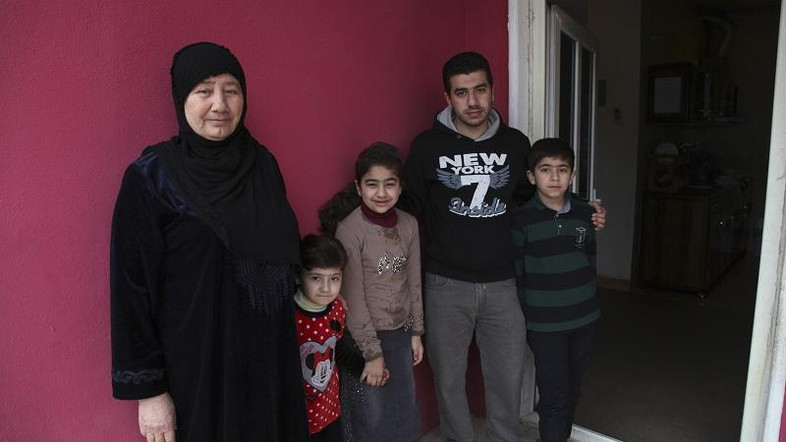

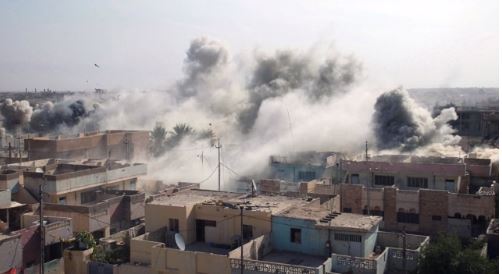





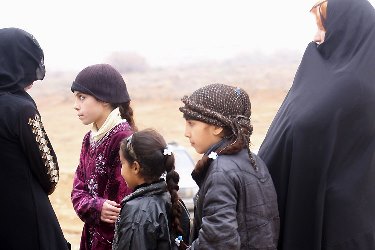
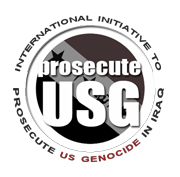
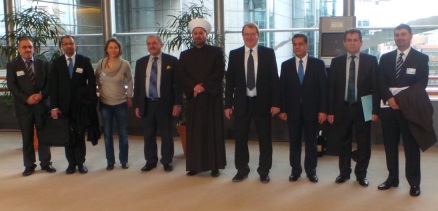
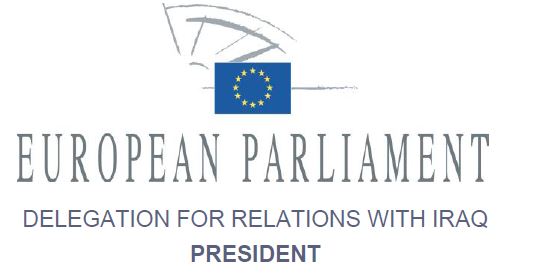 A
high-level conference involving some of the most prominent political
and religious leaders in Iraq, was held in the European Parliament,
Brussels, on Wednesday 19th February. Organised and chaired by Struan Stevenson, MEP,
President of the European Parliament's Delegation for Relations with
Iraq, the conference focused on human rights in Iraq and featured
speeches from Sheik Dr Rafe Al Refaei - Grand Mufti of Iraq, Saleem Abdullah Al-Jabori - Chair of the HR Committee in the Council of Representatives, Haidar Mulla - Member of the Iraqi Council of Representatives, Minister Falah Mustafa Bakir - KRG Head of Department of Foreign Relations, Yonadam Kanna - Chair of the Labour and Social Affairs Committee in the Iraqi Council of Representatives, Kamel Zozo - Syriac Assyrian Chaldean Movement, Elisabetta Zamparutti - 'Hands Off Cain' NGO, Btrus Sliwa - Head of the KRG's Independent Human Rights Board, Dr Abdul- Razzaq Rahim al- Shemmeri- Spokesman for the Herak Delegation from Al Anbar Governorate, Dr Sabah Al-Mukhtar - President of the Arab Lawyers Union, UK, Dr Mohammad Taha Hamdoon, Spokesman of the Popular Movement in Iraq, Dr Moneir Hashm Al-Aobyde, Spokesman for the Movement of Baghdad and many others. The eminent speakers were welcomed by Dr. Charles Tannock MEP, Foreign Affairs Spokesman for the ECR Group.
A
high-level conference involving some of the most prominent political
and religious leaders in Iraq, was held in the European Parliament,
Brussels, on Wednesday 19th February. Organised and chaired by Struan Stevenson, MEP,
President of the European Parliament's Delegation for Relations with
Iraq, the conference focused on human rights in Iraq and featured
speeches from Sheik Dr Rafe Al Refaei - Grand Mufti of Iraq, Saleem Abdullah Al-Jabori - Chair of the HR Committee in the Council of Representatives, Haidar Mulla - Member of the Iraqi Council of Representatives, Minister Falah Mustafa Bakir - KRG Head of Department of Foreign Relations, Yonadam Kanna - Chair of the Labour and Social Affairs Committee in the Iraqi Council of Representatives, Kamel Zozo - Syriac Assyrian Chaldean Movement, Elisabetta Zamparutti - 'Hands Off Cain' NGO, Btrus Sliwa - Head of the KRG's Independent Human Rights Board, Dr Abdul- Razzaq Rahim al- Shemmeri- Spokesman for the Herak Delegation from Al Anbar Governorate, Dr Sabah Al-Mukhtar - President of the Arab Lawyers Union, UK, Dr Mohammad Taha Hamdoon, Spokesman of the Popular Movement in Iraq, Dr Moneir Hashm Al-Aobyde, Spokesman for the Movement of Baghdad and many others. The eminent speakers were welcomed by Dr. Charles Tannock MEP, Foreign Affairs Spokesman for the ECR Group.
























